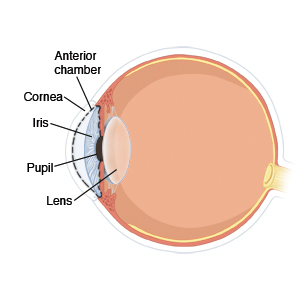Hyphema is the medical term for bleeding in the front part of the eye, between the cornea and iris. This happens most often when there is a direct blow to the eye (with the eyelid open or closed). Injuries are not the only cause of hyphema. It can develop after eye surgery. It may also be a result of blood clotting disorders, tumors in the eye, or abnormal blood vessel growth on the iris, known as rubeosis. Medicines to prevent blood clots also may cause hyphema. Since the blood blocks the passage of light into the eye, it may cause blurred or dim vision. There may also be some pain, which may be a sign of increased pressure in the eye.
When the amount of bleeding is small, the body is able to absorb it and vision returns to normal. Large amounts of blood may need to be removed by surgery. Sometimes bleeding can occur again in the next few days, causing more pressure in the eye. It's important to get the correct treatment to prevent long-term (permanent) vision problems.
Home care
-
Rest for the next 24 hours with your head raised on at least 2 pillows. Stay home from school or work, and don’t do any strenuous activities.
-
You may take acetaminophen for pain, unless another pain medicine was prescribed. Don’t take aspirin or ibuprofen, as these can cause bleeding to occur again. Ask your healthcare provider if it is safe for you to take acetaminophen if you have a history of chronic liver or kidney disease.
-
Limit your eye movement. Don’t read or drive.
-
If an eye patch was applied, don’t drive a motor vehicle or operate machinery with the patch in place. You will have trouble judging distances with 1 eye covered.
Follow-up care
Follow up with your healthcare provider as advised. You may see an eye care provider (ophthalmologist) for another exam. If you are referred to an eye care provider, be sure to keep the appointment. It is very important that you have a repeat eye exam within the next few days. This is to be sure the blood is clearing and to monitor the pressure in the eye.
When to get medical care
Call your healthcare provider or get medical care right away if any of these occur:
-
Eye pain or headache
-
Vision gets worse
-
Eye redness or swollen eyelids
-
Drainage from the eye


